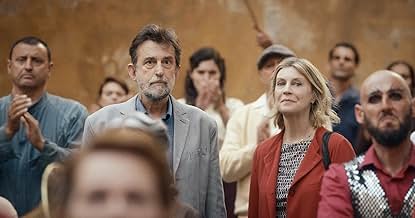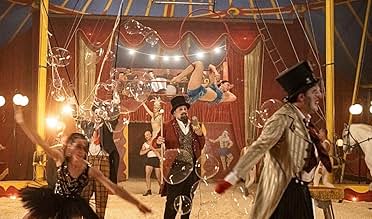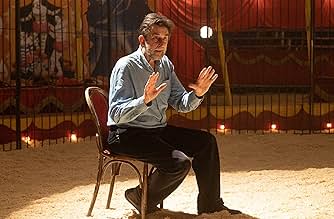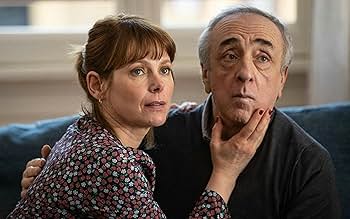IMDb RATING
6.7/10
3.8K
YOUR RATING
A movie director struggles with his relationship with his family, and with his latest movie, about the impact on the Italian Communist Party of the USSR invasion of Hungary in 1956.A movie director struggles with his relationship with his family, and with his latest movie, about the impact on the Italian Communist Party of the USSR invasion of Hungary in 1956.A movie director struggles with his relationship with his family, and with his latest movie, about the impact on the Italian Communist Party of the USSR invasion of Hungary in 1956.
- Awards
- 2 wins & 21 nominations total
Featured reviews
A Brighter Tomorrow, directed by Nanni Moretti, is a deeply introspective work that grapples with the challenges of aging, personal relationships, and the fading ideals of the past. The film weaves a meta-narrative as Moretti portrays a filmmaker struggling to complete a movie about the Italian Communist Party during the USSR invasion of Hungary in 1956, while also navigating the complexities of his personal life.
Moretti's performance is poignant, as he channels his characteristic wit and self-awareness to reflect on the inevitability of change. Margherita Buy and Silvio Orlando deliver nuanced portrayals, adding depth to the story's emotional layers. The interplay between Moretti's fictional and real-life personas creates a dialogue with the audience, blending humor and melancholy in a way that feels uniquely his own.
The film excels in its quieter moments, such as a scene where a reluctant young couple watches *La Dolce Vita*, a symbolic nod to the contrasts between generational attitudes. Moretti resists succumbing to nostalgia, instead embracing a tempered optimism that acknowledges the wounds of the past while looking toward the future. The sun may continue to rise, but it does so over landscapes marked by the scars of time.
A Brighter Tomorrow is not without its flaws-some viewers may find its self-referential approach too insular-but it remains a compelling exploration of resilience and the enduring power of art and connection.
Rating: 8/10 - A thoughtful and bittersweet meditation on change and perseverance.
Moretti's performance is poignant, as he channels his characteristic wit and self-awareness to reflect on the inevitability of change. Margherita Buy and Silvio Orlando deliver nuanced portrayals, adding depth to the story's emotional layers. The interplay between Moretti's fictional and real-life personas creates a dialogue with the audience, blending humor and melancholy in a way that feels uniquely his own.
The film excels in its quieter moments, such as a scene where a reluctant young couple watches *La Dolce Vita*, a symbolic nod to the contrasts between generational attitudes. Moretti resists succumbing to nostalgia, instead embracing a tempered optimism that acknowledges the wounds of the past while looking toward the future. The sun may continue to rise, but it does so over landscapes marked by the scars of time.
A Brighter Tomorrow is not without its flaws-some viewers may find its self-referential approach too insular-but it remains a compelling exploration of resilience and the enduring power of art and connection.
Rating: 8/10 - A thoughtful and bittersweet meditation on change and perseverance.
In "The Sun of the Future," Nanni Moretti reinvents himself as a consummate filmmaker, expressing his views on the political world, streaming platforms, contemporary cinema, his personal life, and his relationship with his partner more forcefully than ever before. This astonishing Italian comedy delves into the critique of all these aspects through the film that the main character (played by Moretti) is filming.
Compared to "Dear Diary" (1993), which was more personal and, if I may say so, somewhat egocentric, "The Sun of the Future" stands out for being exceptionally political and romantic. This film perfects the autobiographical approach the director explored in his previous work.
The film serves as a starting point for an important debate about independent cinema and the strategies it must employ to survive in the streaming era. Moretti criticizes the current trend in which movies are expected to lay out their entire plot within the first two minutes, an illogical formula in his perspective and characteristic of the senseless surge of streaming in recent years.
Ultimately, "The Sun of the Future" is a work imbued with an underlying sentiment: love. Love is the driving force and the brake in the entire narrative, a crucial element that can change things for better or for worse.
Compared to "Dear Diary" (1993), which was more personal and, if I may say so, somewhat egocentric, "The Sun of the Future" stands out for being exceptionally political and romantic. This film perfects the autobiographical approach the director explored in his previous work.
The film serves as a starting point for an important debate about independent cinema and the strategies it must employ to survive in the streaming era. Moretti criticizes the current trend in which movies are expected to lay out their entire plot within the first two minutes, an illogical formula in his perspective and characteristic of the senseless surge of streaming in recent years.
Ultimately, "The Sun of the Future" is a work imbued with an underlying sentiment: love. Love is the driving force and the brake in the entire narrative, a crucial element that can change things for better or for worse.
A film that's different from the usual, almost a metafilm into which other films are interwoven. Moretti talks to us about history, politics, love, violence, and physical decay. In some ways, it's also very autobiographical. Despite the many themes the director has inserted, everything flows smoothly towards an ending that leaves some threads of hope for the audience. I left the cinema feeling happy, despite everything. For this, I want to thank Moretti. At some point, it wasn't so obvious. The actors' performances were also great, especially those of Silvio Orlando and Margherita Buy, as well as Amalric's. In short, it's the usual Moretti film that never disappoints and I believe can be appreciated not only by an Italian audience but also an international one.
I didn't like this movie at all. Perhaps this was a movie for die hard Moretti fans that saw all his movies? For me the story was very weak, the pace was utterly slow and clearly they should prohibit certain directors to act in their own movies. There were some nice shots and sure I could smile a few times. I guess a metafilm can work, but I couldn't relate to neither one of the stories and both of the stories were quite superficial and unexciting. In short: I agree with the reviewer of the gardian who writes: "I'm sure the future will be brightened by another, better Moretti film - this one is best forgotten."
On the occasion of his 70th birthday, Director Moretti sends a heartfelt love letter to his fans, reliving the themes that made him popular and acclaimed over the course of 50 years. The story jumps between three distinct layers: Moretti's own life, the movie he is shooting, and the movie he is about to make, with each providing its own share of humorous moments, successes, and of course, failures (due to Moretti's intrinsically pessimistic outlook). Compiled from both his own works and the works of those who have inspired him, particularly Federico Fellini, the movie is ultimately an observation of the passage of time, with a faint but lasting hope of a future. When you let it be.
Did you know
- TriviaSelected to compete for the Palme d'or in the 2023 Cannes Film Festival. This is the ninth time that a film from director Nanni Moretti is selected at Cannes; every movie he made since "Caro diario" has been at Cannes, he even won the Palme d'or in 2001 with "The Son's Room."
- ConnectionsFeatures La Dolce Vita (1960)
- How long is A Brighter Tomorrow?Powered by Alexa
Details
- Release date
- Countries of origin
- Languages
- Also known as
- Lo mejor está por venir
- Filming locations
- Production companies
- See more company credits at IMDbPro
Box office
- Budget
- €12,284,110 (estimated)
- Gross worldwide
- $6,668,544
- Runtime
- 1h 35m(95 min)
- Color
- Aspect ratio
- 1.85 : 1
Contribute to this page
Suggest an edit or add missing content

![Watch Trailer [OV]](https://m.media-amazon.com/images/M/MV5BZjUxOGY3NjUtN2RiNy00NDlkLWE4MGYtZjkxMTU2MmNmOTBmXkEyXkFqcGdeQXRyYW5zY29kZS13b3JrZmxvdw@@._V1_QL75_UX500_CR0)




























